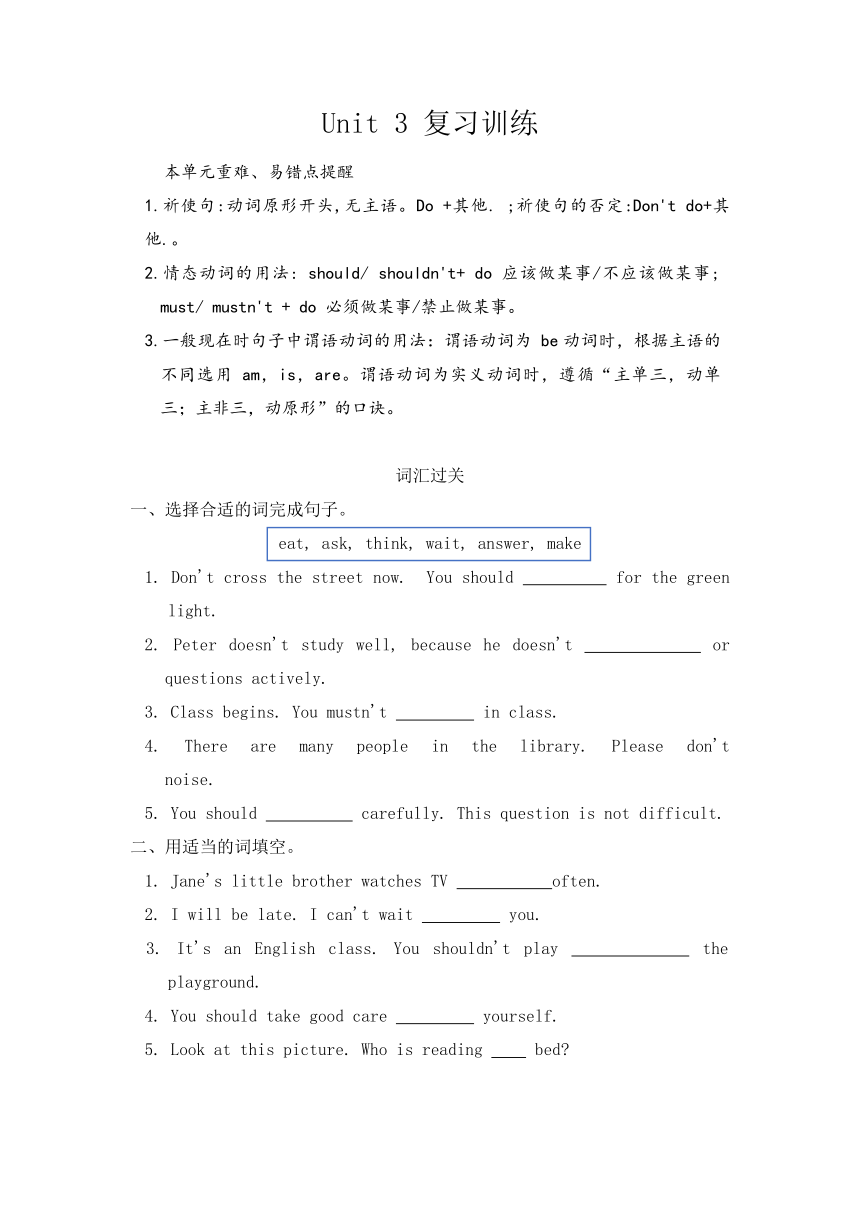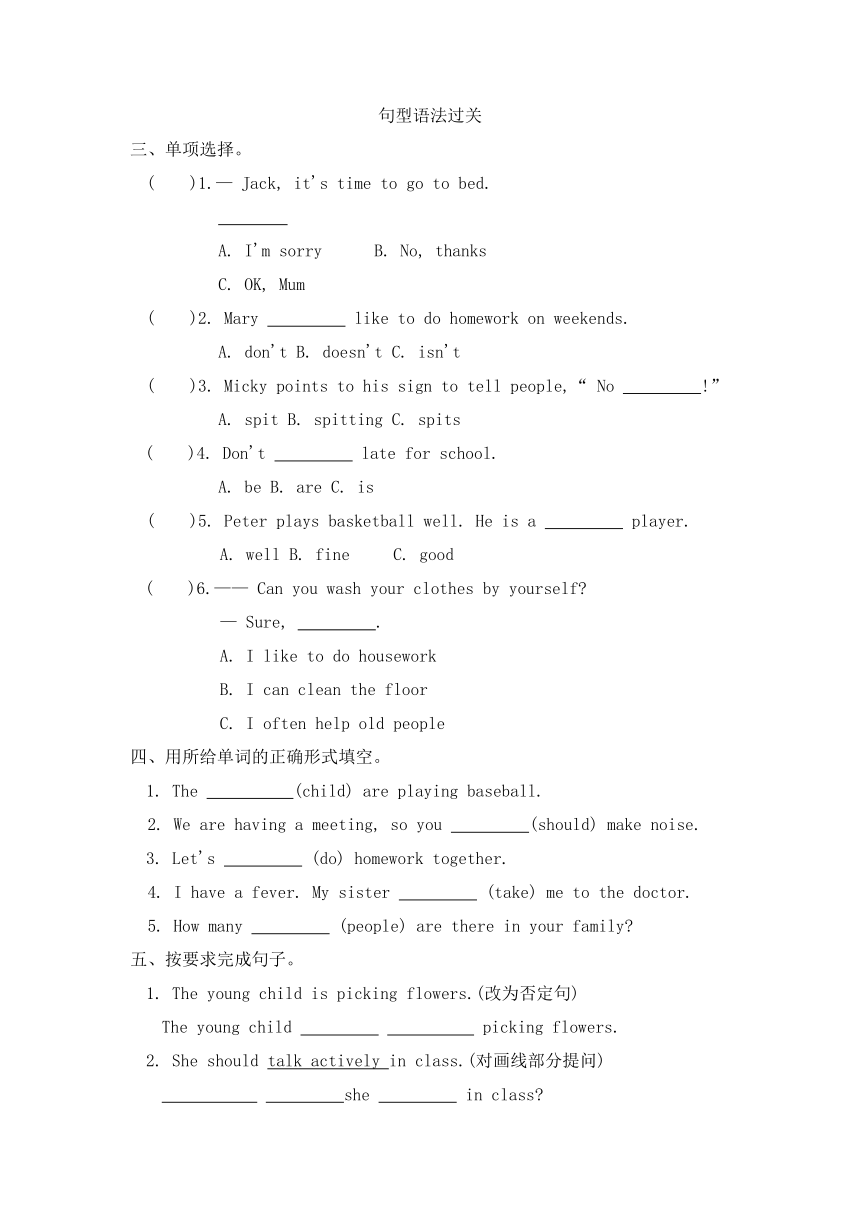Unit 3 We should obey the rules.复习训练试卷(含解析)
文档属性
| 名称 | Unit 3 We should obey the rules.复习训练试卷(含解析) |  | |
| 格式 | docx | ||
| 文件大小 | 24.4KB | ||
| 资源类型 | 教案 | ||
| 版本资源 | 人教精通版(三年级起点) | ||
| 科目 | 英语 | ||
| 更新时间 | 2025-04-13 08:17:16 | ||
图片预览


文档简介
Unit 3 复习训练
本单元重难、易错点提醒
1.祈使句:动词原形开头,无主语。Do +其他. ;祈使句的否定:Don't do+其他.。
2.情态动词的用法: should/ shouldn't+ do 应该做某事/不应该做某事; must/ mustn't + do 必须做某事/禁止做某事。
3.一般现在时句子中谓语动词的用法:谓语动词为 be动词时,根据主语的不同选用 am,is,are。谓语动词为实义动词时,遵循“主单三,动单三;主非三,动原形”的口诀。
词汇过关
一、选择合适的词完成句子。
eat, ask, think, wait, answer, make
1. Don't cross the street now. You should for the green light.
2. Peter doesn't study well, because he doesn't or questions actively.
3. Class begins. You mustn't in class.
4. There are many people in the library. Please don't noise.
5. You should carefully. This question is not difficult.
二、用适当的词填空。
1. Jane's little brother watches TV often.
2. I will be late. I can't wait you.
3. It's an English class. You shouldn't play the playground.
4. You should take good care yourself.
5. Look at this picture. Who is reading bed
句型语法过关
三、单项选择。
( )1.— Jack, it's time to go to bed.
A. I'm sorry B. No, thanks
C. OK, Mum
( )2. Mary like to do homework on weekends.
A. don't B. doesn't C. isn't
( )3. Micky points to his sign to tell people,“ No !”
A. spit B. spitting C. spits
( )4. Don't late for school.
A. be B. are C. is
( )5. Peter plays basketball well. He is a player.
A. well B. fine C. good
( )6.—— Can you wash your clothes by yourself
— Sure, .
A. I like to do housework
B. I can clean the floor
C. I often help old people
四、用所给单词的正确形式填空。
1. The (child) are playing baseball.
2. We are having a meeting, so you (should) make noise.
3. Let's (do) homework together.
4. I have a fever. My sister (take) me to the doctor.
5. How many (people) are there in your family
五、按要求完成句子。
1. The young child is picking flowers.(改为否定句)
The young child picking flowers.
2. She should talk actively in class.(对画线部分提问)
she in class
3. obey, school, should, rules, students(.)(连词成句)
4. Peter often does his homework at home.(改为一般疑问句)
Peter often his homework at home
综合运用过关
六、从方框中选择合适的应答语。
A. They are cleaning the rooms.
B. It's only fifteen yuan.
C. You shouldn't pick flowers.
D. She has a fever.
E. OK, we won't.
( )1. What are your parents doing
( )2. What's wrong with her
( )3. The flowers are so beautiful.
( )4. How much is the toy motorbike
( )5. Don't talk about computer games in class.
七、阅读短文,判断正(T)误(F)。
Every school has its own rules, and so does our school. For example, we can bring drinks to school. But we mustn't bring mobile phones to school. I think this rule is great, because the mobile phones are not good for our study. We can also play basketball and football. We must wear school uniforms. We should study hard. These are our school rules.
( )1. Every school has its rules.
( )2. We can't drink drinks at school.
( )3. We mustn't use our own mobile phones at school.
( )4. In our school, each student should study hard.
( )5. We can wear the clothes that we like at school.
参考答案:
词汇过关
一、1. wait 点拨: wait for the green light 等待绿灯。
2. ask; answer 点拨: ask or answer questions actively 积极地问答问题。
3. eat 点拨: eat in class 在课上吃东西。
4. make 点拨: make noise 制造噪音。
5. think 点拨: think carefully 认真思考。
二、1. too 点拨: watch TV too often 看电视太频繁。
2. for 点拨: wait for等待。
3. on 点拨: play on the playground 在操场上玩耍。
4. of 点拨: take good care of yourself 照顾好你自己。
5. in 点拨: read in bed 在床上读书。
句型语法过关
三、1. C 点拨:上句句意为“杰克,到了该睡觉的时间了。”,杰克应回答“好的,妈妈”。
2. B 点拨:本题为一般现在时,主语 Mary是第三人称单数,否定句中助动词用 doesn't。
3. B 点拨: No doing. 不要做……, spit变为 doing形式为spitting。
4. A 点拨:祈使句的否定形式为 Don't do,因此需要用原形 be。
5. C 点拨: a good player一位好运动员,形容词 good 修饰名词 player。
6. A
四、1. children 点拨: be 动词为 are,所以主语为复数, child变复数为 children。
2. shouldn't 点拨:句意为“我们正在开会,所以你不应该制造噪音”。
3. do 4. takes 5. people
五、1. is not 点拨:原句谓语动词为 be 动词 is, be动词的否定在 be 动词后加 not。根据两个空可知填写 is not。
2. What should; do 点拨:画线部分为动词词组,因此用what提问,句子开头单词首字母要大写。第三空,因talk已在画线部分,不能写入问句,因此用动词原形 do代替。
3. Students should obey school rules.
4. Does;do 点拨:原句谓语动词为实义动词 do 的单三形式 does,谓语动词为实义动词单三形式的句子改成一般疑问句时,要用 Does提问,主语后的实义动词要用动词原形。
综合运用过关
六、1. A 2. D 3. C 4. B 5. E
七、1. T 点拨:根据文章中的“Every school has its own rules…”可知。
2. F 点拨:根据文章中的“… we can bring drinks to school.”可知我们可以带饮料到学校,与题目冲突。
3. T 点拨:根据文章中的“But we mustn't bring mobile phones to school.”可知。
4. T 点拨:根据文章中的“ We should study hard.”可知。
5. F 点拨:根据文章中的“We must wear school uniforms.”可知在我们学校里,学生们必须穿校服。而题目则说可以穿自己喜欢的衣服,因此冲突。
本单元重难、易错点提醒
1.祈使句:动词原形开头,无主语。Do +其他. ;祈使句的否定:Don't do+其他.。
2.情态动词的用法: should/ shouldn't+ do 应该做某事/不应该做某事; must/ mustn't + do 必须做某事/禁止做某事。
3.一般现在时句子中谓语动词的用法:谓语动词为 be动词时,根据主语的不同选用 am,is,are。谓语动词为实义动词时,遵循“主单三,动单三;主非三,动原形”的口诀。
词汇过关
一、选择合适的词完成句子。
eat, ask, think, wait, answer, make
1. Don't cross the street now. You should for the green light.
2. Peter doesn't study well, because he doesn't or questions actively.
3. Class begins. You mustn't in class.
4. There are many people in the library. Please don't noise.
5. You should carefully. This question is not difficult.
二、用适当的词填空。
1. Jane's little brother watches TV often.
2. I will be late. I can't wait you.
3. It's an English class. You shouldn't play the playground.
4. You should take good care yourself.
5. Look at this picture. Who is reading bed
句型语法过关
三、单项选择。
( )1.— Jack, it's time to go to bed.
A. I'm sorry B. No, thanks
C. OK, Mum
( )2. Mary like to do homework on weekends.
A. don't B. doesn't C. isn't
( )3. Micky points to his sign to tell people,“ No !”
A. spit B. spitting C. spits
( )4. Don't late for school.
A. be B. are C. is
( )5. Peter plays basketball well. He is a player.
A. well B. fine C. good
( )6.—— Can you wash your clothes by yourself
— Sure, .
A. I like to do housework
B. I can clean the floor
C. I often help old people
四、用所给单词的正确形式填空。
1. The (child) are playing baseball.
2. We are having a meeting, so you (should) make noise.
3. Let's (do) homework together.
4. I have a fever. My sister (take) me to the doctor.
5. How many (people) are there in your family
五、按要求完成句子。
1. The young child is picking flowers.(改为否定句)
The young child picking flowers.
2. She should talk actively in class.(对画线部分提问)
she in class
3. obey, school, should, rules, students(.)(连词成句)
4. Peter often does his homework at home.(改为一般疑问句)
Peter often his homework at home
综合运用过关
六、从方框中选择合适的应答语。
A. They are cleaning the rooms.
B. It's only fifteen yuan.
C. You shouldn't pick flowers.
D. She has a fever.
E. OK, we won't.
( )1. What are your parents doing
( )2. What's wrong with her
( )3. The flowers are so beautiful.
( )4. How much is the toy motorbike
( )5. Don't talk about computer games in class.
七、阅读短文,判断正(T)误(F)。
Every school has its own rules, and so does our school. For example, we can bring drinks to school. But we mustn't bring mobile phones to school. I think this rule is great, because the mobile phones are not good for our study. We can also play basketball and football. We must wear school uniforms. We should study hard. These are our school rules.
( )1. Every school has its rules.
( )2. We can't drink drinks at school.
( )3. We mustn't use our own mobile phones at school.
( )4. In our school, each student should study hard.
( )5. We can wear the clothes that we like at school.
参考答案:
词汇过关
一、1. wait 点拨: wait for the green light 等待绿灯。
2. ask; answer 点拨: ask or answer questions actively 积极地问答问题。
3. eat 点拨: eat in class 在课上吃东西。
4. make 点拨: make noise 制造噪音。
5. think 点拨: think carefully 认真思考。
二、1. too 点拨: watch TV too often 看电视太频繁。
2. for 点拨: wait for等待。
3. on 点拨: play on the playground 在操场上玩耍。
4. of 点拨: take good care of yourself 照顾好你自己。
5. in 点拨: read in bed 在床上读书。
句型语法过关
三、1. C 点拨:上句句意为“杰克,到了该睡觉的时间了。”,杰克应回答“好的,妈妈”。
2. B 点拨:本题为一般现在时,主语 Mary是第三人称单数,否定句中助动词用 doesn't。
3. B 点拨: No doing. 不要做……, spit变为 doing形式为spitting。
4. A 点拨:祈使句的否定形式为 Don't do,因此需要用原形 be。
5. C 点拨: a good player一位好运动员,形容词 good 修饰名词 player。
6. A
四、1. children 点拨: be 动词为 are,所以主语为复数, child变复数为 children。
2. shouldn't 点拨:句意为“我们正在开会,所以你不应该制造噪音”。
3. do 4. takes 5. people
五、1. is not 点拨:原句谓语动词为 be 动词 is, be动词的否定在 be 动词后加 not。根据两个空可知填写 is not。
2. What should; do 点拨:画线部分为动词词组,因此用what提问,句子开头单词首字母要大写。第三空,因talk已在画线部分,不能写入问句,因此用动词原形 do代替。
3. Students should obey school rules.
4. Does;do 点拨:原句谓语动词为实义动词 do 的单三形式 does,谓语动词为实义动词单三形式的句子改成一般疑问句时,要用 Does提问,主语后的实义动词要用动词原形。
综合运用过关
六、1. A 2. D 3. C 4. B 5. E
七、1. T 点拨:根据文章中的“Every school has its own rules…”可知。
2. F 点拨:根据文章中的“… we can bring drinks to school.”可知我们可以带饮料到学校,与题目冲突。
3. T 点拨:根据文章中的“But we mustn't bring mobile phones to school.”可知。
4. T 点拨:根据文章中的“ We should study hard.”可知。
5. F 点拨:根据文章中的“We must wear school uniforms.”可知在我们学校里,学生们必须穿校服。而题目则说可以穿自己喜欢的衣服,因此冲突。
同课章节目录
- Unit 1 Welcome to our school!
- Lesson 1
- Lesson 2
- Lesson 3
- Lesson 4
- Lesson 5
- Lesson 6 Revision
- Unit 2 Can I help you ?
- Lesson 7
- Lesson 8
- Lesson 9
- Lesson 10
- Lesson 11
- Lesson 12 Revision
- Unit 3 We should obey the rules.
- Lesson 13
- Lesson 14
- Lesson 15
- Lesson 16
- Lesson 17
- Lesson 18 Revision
- Unit 4 What's wrong with you?
- Lesson 19
- Lesson 20
- Lesson 21
- Lesson 22
- Lesson 23
- Lesson 24 Revision
- Fun Time 1
- Recycle 1
- Recycle 2
- Fun Reading
- Unit 5 I’m cleaning my room.
- Lesson 25
- Lesson 26
- Lesson 27
- Lesson 28
- Lesson 29
- Lesson 30 Revision
- Unit 6 We’re watching the games.
- Lesson 31
- Lesson 32
- Lesson 33
- Lesson 34
- Lesson 35
- Lesson 36 Revision
- Fun Time 2
- Recycle 1
- Recycle 2
- Fun Reading
- 旧版资料
- Unit 1 Do you like young animals?
- Unit 2 They are hens and chicks.
- Unit 4 Is there a library in your class?
- Unit 5 How much is it?
